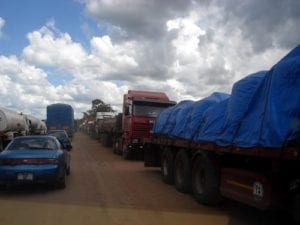Importing and exporting goods anywhere can be challenging, but in Africa delivering goods to customers on time, and at the right cost, is especially fraught with obstacles, which need to be identified and managed correctly. Hugh Reimers, MD: Eikos Risk Applications, discusses the importance of proper insurance when goods are transported through Africa.
One of the factors he highlights is that of delays. Companies, particularly those with perishable goods that have time-sensitive supply chains, face extreme challenges when encountering lengthy delays. Says Reimers, “A standard marine policy does not automatically cover loss or damage as a result of delay. It is imperative that customers arrange cover for loss or damage as a result of delay, should this be a risk. With insurance policies running for an agreed period of time, one can only imagine cost to company in places like Angola, or Tanzania, where delays running into weeks have been recorded.” Road is costly and, at times, dangerous The development of highways throughout Africa provides growing opportunity for road transport, but the actual condition of roads across much of the continent remains poor – the risk of damage to a vehicle is, regrettably, very high. In the event of an accident, an insurer will only consider a claim if the vehicle is completely roadworthy; furthermore, you have a common law duty to disclose anything that is considered to be material to the risk you have insured. If you do not, your insurer also has grounds to reject your claim. If you are in any doubt as to what is material and what isn’t, rather disclose. Inconsistent tax frameworks and costly delays
Companies operating in African countries experience the array of tax systems as an added frustration in the supply chain.
“Where a border official may not agree with the transfer pricing to be applied, the result may typically be double taxation: more administration, more delays. Again, these delays are particularly detrimental for cold chain logistics providers, and must be adequately insured. Another problem facing importers and exporters working within Africa is the return of load cargo, as an empty return leg is expensive and has to be factored into the cost. This costing must be prudently done to remain competitive,” explains Reimers.







